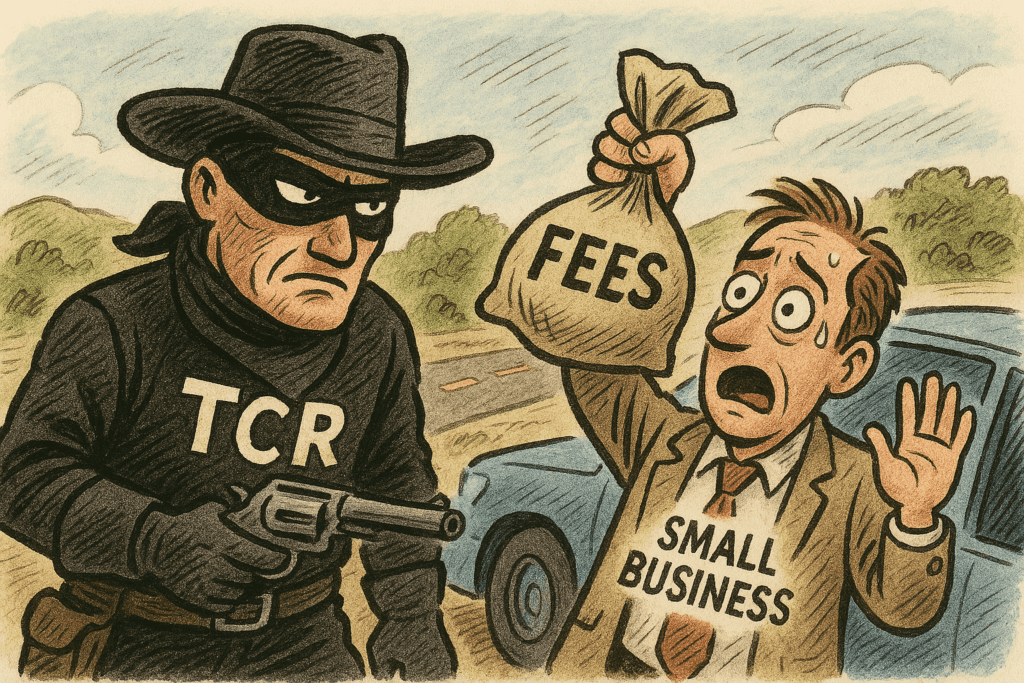
If you run a small business and send text messages to your customers—whether for appointments, updates, or promotions—you’ve probably heard of 10DLC (10-Digit Long Code). It’s a standard business texting number.
To use 10DLC, you now need to go through something called The Campaign Registry, or TCR. It was introduced to stop spam. But in reality, it’s become a bureaucratic trap filled with confusing forms and relentless fees.
And starting August 1st, 2025, it’s getting worse.
New Price Hikes Are Here
TCR just increased nearly every fee. Here’s a breakdown in plain language:
- Brand Registration: Was $4.00 → Now $4.50
- Standard Business Vetting: Was $40.00 → Now $41.50
- Enhanced Vetting: Was $95.00 → Now $101.50
- Political Vetting (email): Was $64.00 → Now $66.00
- Political Vetting (mail): Was $91.95 → Now $96.00
- Authentication + Verification: Now $12.50 (was free)
- Appeal Fee: Now $11.00
These are non-refundable—even if your request is rejected.
Where Does the Money Go? (Spoiler: It’s not just TCR)
While TCR is the most visible part of the 10DLC registration process—and certainly the most frustrating—it’s important to know that not all the fees you pay go to TCR itself.
Here’s how the money typically breaks down:
- TCR: Charges fees for registering your brand and campaign, managing data, and maintaining the campaign registry.
- Third-party vetting partners (like Aegis or WMC): Get paid to verify your business identity and message use case.
- Mobile carriers (like Verizon, AT&T, T-Mobile): Add pass-through fees per message, often the biggest cost over time.
- DCAs (Direct Connect Aggregators): Handle message routing and connectivity to the carrier networks.
- CSPs (Campaign Service Providers): Sometimes add their own markups or management fees on top.
So when you pay $10 to register a campaign, or $0.01 per text, that amount is split across multiple layers of the ecosystem—many of which you never see.
Built to Make You Fail (and Pay Again)
Registering a campaign means providing exact opt-in language, website links, support contact details, and keyword responses like STOP and HELP. If you miss a step—even a word—you’re rejected.
And then you’re charged again. These are just a few of the penalties:
- Business Info Resubmission: $4.50
- Failed Vetting (Standard): $5.00
- Failed Vetting (Enhanced): $6.00
- Failed Political Vetting: $22.00
- Manual Appeal Review: $11.00
This system doesn’t help—it profits from mistakes.
Monthly Campaign Fees Add Up
After setup, you pay monthly just to keep your campaign active—even if you send no messages.
- Low Volume Business Messaging (like UCaaS): $1.50 to $2.00/month
- Charity Campaigns: $3.00/month
- Emergency Notifications: $5.00/month
- Marketing and Mixed Use: $10.00/month
- Franchise & Agent Campaigns: $30.00/month
The System Hurts the Little Guys Most
If you’re a hair salon, dog groomer, or family-owned gym, this system makes texting your customers more expensive and difficult than ever. Meanwhile, major brands with legal teams breeze through it.
And guess what? Spammers still find ways around it. So who really benefits?
What Needs to Change
- Clear, consistent rules that don’t change without notice
- No-charge resubmissions for simple errors
- A free or affordable tier for low-volume senders
- Independent oversight—like from the FCC (Federal Communications Commission)
It’s Not About Trust. It’s About Profit.
TCR was supposed to protect consumers. Instead, it’s a profit machine that charges you to submit forms, punishes your mistakes, and keeps increasing its prices.
Let’s call it what it is: The Telecom Clear Racket.
Small businesses deserve better. We need affordable, transparent communication tools—not roadblocks and fees.